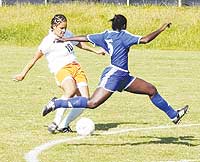
African Soccer, awakening a continental giant
Soccer is alive and well in Africa.
These skills seemed to be unrivalled by their European and North American counterparts. This could be because most of the youth play their soccer (football) in the streets from dusk to dawn. Sometimes these youth have little else to do during the day and not many other national sports to choose from. The youth will play at breaks at school and many other functions. However this is changing as more is being offered especially with the field of Olympic type of sports and as the countries continue to develop. This could also be that the children, boys and girls start playing at a very early age and are exposed to other players virtually all the time. They are learning through observation and "copying" successes. Start sports at an early age It is thought that reaction speed and small motor co-ordination develops and is consolidated before age seven (7). This means that children no matter where they may live have an advantage when they start any athletic activities at an early age. Play is a very important part of life, especially open and creative play. As the child and youth grow older they can then have more of a structured environment to develop team play. In Africa there are fewer venues offered for practice and play than in North America and Europe. This results in the game being played in all kinds of conditions, sometimes with poor or no equipment at all. Different conditions force the player to be
more aware of the total playing environment. This is the
surface (field) conditions... if there is a field, and the
size, shape and pressure of the ball... Most games are played with fewer players...small sided games. This produces more touches on the ball under pressure. The Dutch recognized this and organize programs to include this idea. They will sometimes not have full sided games...that is 11 aside teams for youth under 16 years old. This helps develop more individual touches on the ball. For more information on youth development go to Youth Soccer. Women's Development Some parts of the continent are promoting
women's football, realizing that it is a huge benefit to the
overall well being of society as well as nation building. It takes the will to start even at the local
level in small villages and townships. However something must
be done. The social fabric is strengthened by mass
participation and the addition of women into any country's
sports activities. Soccer is one of the most beneficial sports
around. People are engaged in friendly, physical and mental
competition. This heightens the awareness of all other issues
within societies by enabling people to be engaged in
activity.
Yes, "Soccer is Life". Women are a third of the equation and keepers of unity within the family. More women need to be trained as coaches, administrators, managers and in the fields of fitness, health and welfare and also technical advisors. The future is bright, it is friendly and soccer is alive and well on the continent of Africa. For more on the ever evolving women's soccer go to Women's Soccer. and the following will take you to some links to other African Soccer information.
videos of JJ Okocha et al http://www.youtube.com/watch?v=swptzrAb3as
|
Soccer Training Skills - Home Soccer Speed Training Soccer GoalKeeper Training Soccer Coaching Tips Mental Focus Youth Soccer Women's Soccer Soccer articles Contact Page Privacy Statement


